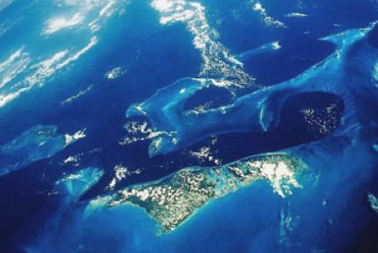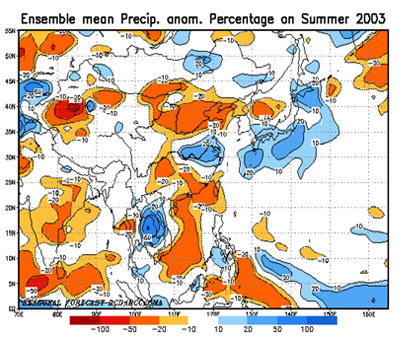WMO Regional Climate Centers (RCCs)
In 1998, WMO formally made plan of WMO RCC. In April, 2001, WMO organized the Inter-Commission Task Team on Regional Climate Centres (ICTT),discussed on definition, functions, tasks and development of RCC. In May, 2003, 14th WMO Congress urged CCl to develop guidelines and procedures to assist the regional associations in the implementation of the RCC.
To better performance its functions as a WMO Regional Climate Centre (RCC), the Beijing Climate Centre (BCC) was set up in 2003, which was designated as a WMO RCC in RA II (Asia) at EC-LXI in June 2009. BCC began its official operation as from 1 July 2009. BCC has the obligations to deliver climate service for to the neighboring and surrounding countries in Asia and international climate community, and it has the following capabilities as a RCC.
BCC incorporates a WMO East Asian Monsoon Activity Centre (EAMAC), a WMO Global Producing Centre (GPC) for long-range forecasts, and a Centre for Extreme Events Monitoring in Asia (CEEMA). In 2006, BCC became one of GPC for long-range forecast within WMO framework. BCC produces and provides real-time interpretation and assessment of multi-model ensemble products. As a WMO EAMAC since 2006, BCC established website (http://bcc.cma.gov.cn/EAMAC/) to provide monsoon information service for RAII. In 2010, WMO confirmed the establishment of CEEMA to collect and archive data and/or information needed for monsoon research, particularly for research on high-impact weather in the monsoon regions.
BCC organizes and coordinates research efforts on regional climate, operational predictions and climate application and services, among others, and it also provides climate services to China and other Asian countries for disaster prevention and mitigation and for socio-economic development. BCC has made some significant progress in activities as a WMO RCC, such as operational long-range forecasts, climate monitoring, data services, use of regional climate products and training on service delivery, research on climate and climate change as well as capacity building. BCC is also engaged in climate data management and rescue for RAII, and involved in the International ACRE (Atmospheric Circulation Reconstructions over the Earth) Initiative to facilitate the recovery of historical surface data in RAII.
As one of the first officially designated WMO RCC, BCC played a leading role in initiating and sustaining the Regional Climate Outlook Forum (RCOF) process in Asia. The Beijing Climate Centre has been organizing the Forum on Regional Climate Monitoring, Assessment and Prediction for Asia (FOCRAII) every year since 2005 in order to provide climate applications and services of high quality. As a platform for exchanging and sharing experience and knowledge in seasonal prediction, FOCRAII has benefited WMO Members, especially those in RA II in fostering networks of climate experts and producing consensus-based forecasts for the Region. The forum focuses on seasonal to inter-annual climate prediction, East Asian monsoon activities, climate monitoring and impact assessment, climate system modeling, regional climate cooperation and implementation of the GFCS.
In conclusion, BCC has substantively enhanced its capabilities over past decade by improving its regional climate models, refining its climate products to meet the regional demands, establishing links with operational centers, co-sponsoring climate workshops, pilot projects, climate outlooks and a co-operated portal site within the region, and implementing WMO criteria for establishment of RCC, etc. BCC will actively expand and improve its skills in delivery of improved, targeted and tailored climate information, products and advisories for WMO Members of RA II, and eventually to make a due contribution to the Global Framework for Climate Services (GFCS) proposed by the Third World Conference (WCC-3).
Website : www.rccra2.org
The Meeting of the RA II Working Group on Climate Services (WGCS) was held during 10-12 December 2018 in Beijing, China. Totally 15 participants from WMO Secretariat, Bhutan, China, Iran, Japan, Republic of Korea, Myanmar, Pakistan and Russia attended the meeting. Dr. Xiaolong Jia from BCC and Dr. R. Kolli from WMO made addresses in the opening. This is the first meeting of RAII WGCS. The meeting briefed on recent WMO initiatives of climate services, overviewed the progress/update of implementation of RCCs in RAII, reviewed the progress on EG-CS and EG-AgM activities, and updated the work plan for RAII WGCS.
Prof. Tang’s report mainly focused on 1) introduction of new method in measuring potential climate predictability; 2) analysis method by using seasonal prediction multi-model hindcast data and major component of “maximum predictable information”; 3) comparison between potential predictable skill and real skill by using multi- and single model ensemble prediction results.
On 6 April 2010, the First Meeting of BCC Scientific Advisory Committee (BCC SAC) was held in Beijing. Experts from USA, UK, France, Korea, Japan and China attended the meeting, including Academician Yihui DING, Dr. Yong LUO, Dr. Feifei JIN, Dr. Song YANG, Dr. Timothy Nigel Stockdale, Dr. Ngar-Cheung LAU, Prof. In-Sik Kang, Prof. Chih-Pei Chang, Prof. Akio Kito, Dr. Zhaoxin Laurent LI, Dr. Yuping YAN, Dr. Tongwen WU and Dr. Fumin REN.

Global Atmosphere Watch Programme

Global Observing System

Marine Meteorology and Oceanography Programme

A comprehensive climate model system has been developed aiming at short-term climate prediction in the timescales from month to interannual over East Asia and the globe, and for the climate simulation to explore the physical mechanism of climate variability and climate change. It consists of a global AGCM model which is applied for dynamic extending forecast in a month timescale, a high resolution regional climate model over East Asian nested with a medium resolution AOGCM for seasonal prediction, and a simplified air-sea coupled model for ENSO interannual prediction. All these models together with the corresponding pre- and post-precessing system form the first generation operational dynamic prediction system at National Climate Center, which can be applied for the studies on climate variability and climate change. 
Friendly link
Links to GPC websites
Links to NMHSs in RA II
Copyright:© 2005 ~ 2023 Beijing Climate Centre. All rights reserved. Technical support: zhongyan
address:46 South Street, Zhongguancun, Haidian District, Beijing Zip code:100081
Today:01696/Total:34984435